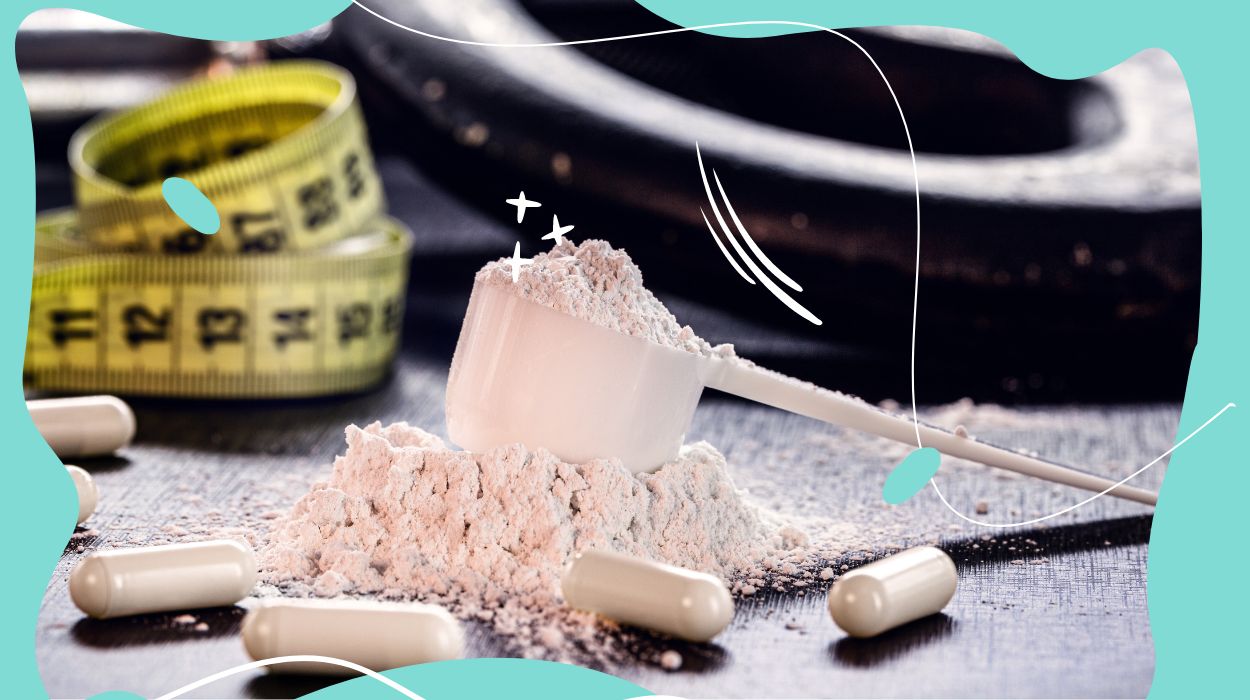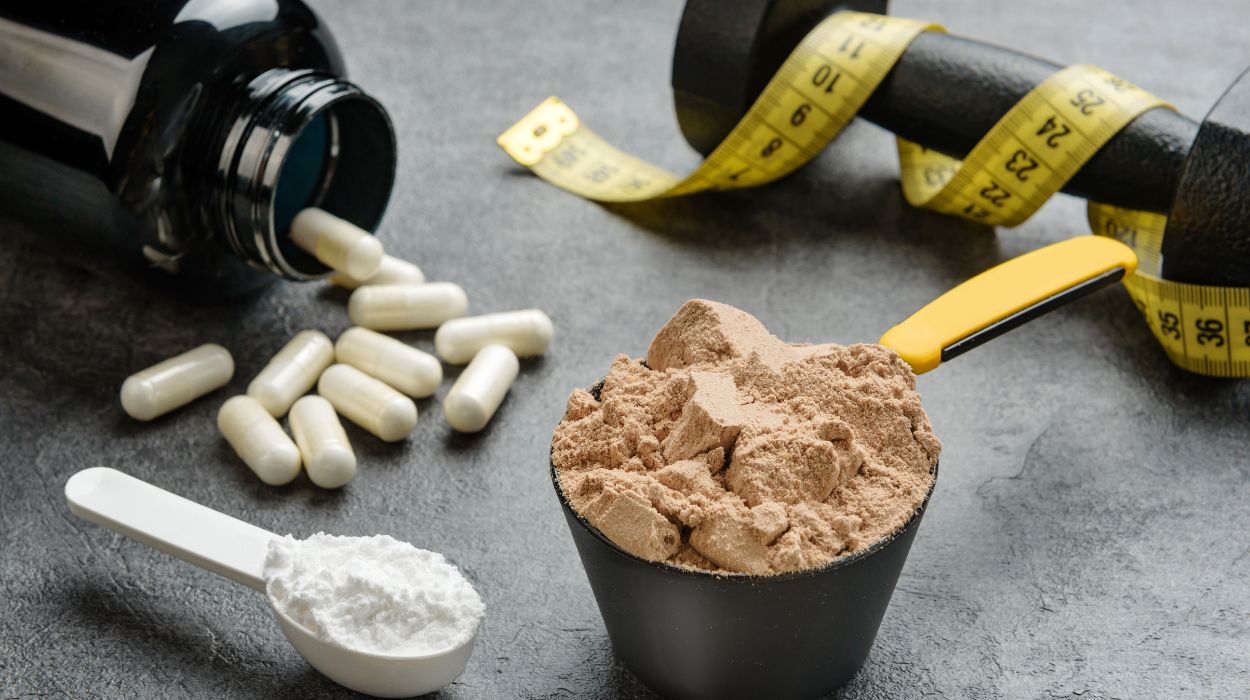 Expert's opinion
Expert's opinion
Expert's opinion
The article is a subjective view on this topic written by writers specializing in medical writing.
It may reflect on a personal journey surrounding struggles with an illness or medical condition, involve product comparisons, diet considerations, or other health-related opinions.
Although the view is entirely that of the writer, it is based on academic experiences and scientific research they have conducted; it is fact-checked by a team of degreed medical experts, and validated by sources attached to the article.
The numbers in parenthesis (1,2,3) will take you to clickable links to related scientific papers.
Does Creatine Help You Lose Weight Or Make You Fat? What’s The Truth 2024?

Creatine is a popular supplement used by many athletes and gym-goers. This amino is part of most supplements to support increasing lean muscle mass and improving athletic performance. Proper use and dosage of nutritional supplements, like creatine, are vital for optimal results.
But does creatine help you lose weight? If you are hitting the gym, you might wonder if creatine can help you lose weight or cause weight gain. To lose weight while on creatine, try taking creatine right after your workout with a carbohydrate (carb) source, so the creatine is fully taken up by the muscle. Water retention when starting creatine may occur, which increases your weight.
Read on to find out more about creatine and weight loss.
Does Creatine Help You Lose Weight?
Does creatine help you lose weight? Although creatine is not considered a weight loss supplement, it may be of support if you are including physical activity, particularly strength training. Some preliminary data[1] shows that creatine, together with resistance training, may cause modest fat loss.
How Does Creatine Help With Losing Weight?
In a meta-analysis[1], men over 50 who took creatine in combination with resistance training experienced slightly more fat loss percentage than those who did not. This was around 0.5 kilograms more than without supplementation. However, more research is needed, along with expanding the tested population to determine if it can support weight management.
For people who want to lose body weight, it is recommended to lead a healthy and active lifestyle. Decreasing calories consumed by 250-500 daily can help you shed 0.5-1lb per week. This is a sensible weight loss that can be maintainable long-term with a small caloric deficit. If excess calories are consumed, you may experience undesired fat weight gain.
Adding a creatine supplement may help you increase muscle mass and improve exercise endurance, so you can train efficiently and burn more calories.
Discuss with your medical provider or sports nutrition dietitian before starting nutritional supplements. Not everybody will experience the same results while using creatine. Stop taking oral creatine if you are experiencing any adverse effects.
What Does Creatine Do?
Creatine is an amino acid that is produced by our liver and kidneys. It can be synthesized in the liver and pancreas from other amino acids like arginine, glycine, and methionine. Our bodies form creatine phosphate, storing most of it in the muscle for rapid energy creation. Creatine can also be found in the brain and testes.
This amino acid can also be found in foods like pork, beef, salmon, and tuna. We can consume around 2-5 grams (g) of creatine from foods. While we can synthesize around half of what our bodies need, adequate consumption of creatine may be needed to achieve proper muscle storage levels.
Creatine helps your body create energy. Our cells use adenosine triphosphate (ATP) as an energy currency. When we run out of ATP during a workout, creatine phosphate comes into play to produce more energy. In addition, creatine has evidence to support a possible increase in muscle mass and strength and improvement in athletic performance and recovery.
The supplement form can be useful to achieve creatine saturation in the muscles and maintain adequate stores while working out. You can consume more creatine from supplementation than from foods or body production. This is helpful for people with little animal protein consumption or on a calorie-restricted diet, who would like to maintain performance in their workouts.
Health Benefits of Creatine
Oral creatine supplementation[2] has been studied extensively, in particular creatine monohydrate. It is generally considered safe[3] to use. There are reports of potential health benefits with creatine use, in addition to its ergogenic effect.
Increase In Muscle Mass and Strength
Creatine supplementation may help increase your muscle mass when working out by decreasing protein breakdown. This can translate to increase muscle power.
Enhance Athletic Performance In Specific Sports
There is evidence[2] that it can help improve performance in jumping, rowing, and soccer. Although not much benefit in other sports. Possibly related to how increased muscle mass may affect performance in sports like swimming.
Increase Endurance
Oral creatine supplementation can be useful to keep you going during your workout. This is done by helping the body continue producing energy, resulting in muscular endurance.
Help With Recovery
Creatine supplementation can be helpful for athletes to recover[4] from heavy training. This could be possibly related to decreasing inflammation and improved glycogen (energy stored) storage facilitating exercise recovery.
Help Manage Diabetes
Creatine supplementation in combination with an exercise training program affects glucose[5] use. Creatine itself may increase insulin levels and improve glucose transport to the cell.
Improved Cognition
In a systematic review[6], investigators noted improvement in short-term memory and reasoning in healthy individuals. This line of study will hopefully be of help with aging changes.
Treatment of Sarcopenia and Cachexia
There is an interest in using creatine supplements to protect or increase lean body mass in people with cancer or age-related muscle loss. Although there is not enough evidence[7] to prove it is beneficial to prevent losing muscle.
Potential Side Effects
Side effects are possible with any supplement. Some studies[8] found reports of muscle cramps and dehydration with creatine use. Investigators could not exclude other causes like excessive heat, multiple supplement use, or poor hydration. It is advised to drink plenty of liquids when taking oral creatine to prevent dehydration and cramps.
People may experience water weight gain[8] after starting the supplement. This is mostly related to water retention in the muscle, and should not be confused with fat gain. This fluid weight gain is temporary and should decrease after several days. Creatine supplementation and a weight training plan may help you increase muscle mass.
Using creatine supplements has yet to be associated[8] with increased body fat. Although it might help you build lean muscle mass, potentially increasing your weight on the scale from associated water retention. Also, the initial water weight gain may be perceived as unwanted weight gain.
While using creatine supplements, it might be best to avoid[2] caffeine. This may interact and not have the desired performance effect. It further enhances the chances of developing dehydration.
People with kidney disease, Parkinson’s disease, and bipolar disease should avoid[2] this supplement. It is also not advised for those under the age of 18 years.
How To Take Creatine For Weight Loss?

There is no prescribed dosage of creatine to promote weight loss. You can use creatine to keep you energized during your workouts and increase lean muscle mass, resulting in more calories burned and leading to a calorie deficit.
A common practice is to have a loading phase[8] when beginning supplementation. Starting with
5 grams of creatine monohydrate (or approximately 0.3 g/kg body weight) four times daily for 5–7 days to help saturate creatine levels in the muscles.
Later adjust to a maintenance dose of 3-5 grams per day, before[9] or after your workout. You should not consume the loading dose in smaller frequencies to prevent gastrointestinal distress.
Another option is to skip the creatine loading dose and start the supplement at the lower maintenance dose of 3-5 grams of creatine per day. This could also be of benefit if you would like to avoid the initial water weight gain.
Consuming a carbohydrate or a carbohydrate/protein with creatine may help the uptake[3] of creatine in the muscle and reduce water retention in the muscle tissues. Mix your supplement with 100% fruit juice, a sports drink, or with a whey protein supplement. These options will work as a carbohydrate source, with the last one containing only protein.
You can also use foods to pair up with your creatine supplement. Eat a balanced meal after your workout that includes carbohydrates (brown rice, potatoes, sweet potatoes,…) and protein (eggs, beef, poultry, fish,…). This combination, either with foods or supplements, can make sure optimal creatine retention[3] in muscle tissue.
Final Thought: Is Creatine Good for Weight Loss?
In reality, some research shows creatine itself may increase body fat loss. On the other hand, using a creatine supplement can promote muscle growth, which may burn calories at rest.
It can still cause increased weight gain from muscle mass and result in water retention, which can be a frustrating side effect.
However, it may help you work out longer by maintaining energy production in anaerobic conditions, thus burning more calories and facilitating a weight deficit.
A good thing to know is that this supplement has minimal side effects. Any weight gain that occurs is most likely temporary. There is no evidence that creatine will increase body fat at this time, but there is limited evidence to show that it may cause a reduction in fat weight.
+ 9 sources
Health Canal avoids using tertiary references. We have strict sourcing guidelines and rely on peer-reviewed studies, academic researches from medical associations and institutions. To ensure the accuracy of articles in Health Canal, you can read more about the editorial process here
- Forbes, Candow, Krentz, Roberts and Young (2019). Changes in Fat Mass Following Creatine Supplementation and Resistance Training in Adults ≥50 Years of Age: A Meta-Analysis. Journal of Functional Morphology and Kinesiology, [online] 4(3), p.62. doi:10.3390/jfmk4030062.
- Medlineplus.gov. (2018). Creatine: MedlinePlus Supplements. [online] Available at: https://medlineplus.gov/druginfo/natural/873.html
- Buford, T.W., Kreider, R.B., Stout, J.R., Greenwood, M., Campbell, B., Spano, M., Ziegenfuss, T., Lopez, H., Landis, J. and Antonio, J. (2007). International Society of Sports Nutrition position stand: creatine supplementation and exercise. Journal of the International Society of Sports Nutrition, [online] 4(1). doi:10.1186/1550-2783-4-6.
- Kreider, R.B., Kalman, D.S., Antonio, J., Ziegenfuss, T.N., Wildman, R., Collins, R., Candow, D.G., Kleiner, S.M., Almada, A.L. and Lopez, H.L. (2017). International Society of Sports Nutrition position stand: safety and efficacy of creatine supplementation in exercise, sport, and medicine. Journal of the International Society of Sports Nutrition, [online] 14(1). doi:10.1186/s12970-017-0173-z.
- Oliveira, C., Botelho, P., Gustavo Duarte Pimentel and João Felipe Mota (2016). Creatine supplementation and glycemic control: a systematic review. [online] ResearchGate. Available at: https://www.researchgate.net/publication/304005985_Creatine_supplementation_and_glycemic_control_a_systematic_review
- Avgerinos, K.I., Spyrou, N., Bougioukas, K.I. and Kapogiannis, D. (2018). Effects of creatine supplementation on cognitive function of healthy individuals: A systematic review of randomized controlled trials. Experimental Gerontology, [online] 108, pp.166–173. doi:10.1016/j.exger.2018.04.013.
- Sakkas, G.K., Schambelan, M. and Mulligan, K. (2009). Can the use of creatine supplementation attenuate muscle loss in cachexia and wasting? Current Opinion in Clinical Nutrition and Metabolic Care, [online] 12(6), pp.623–627. doi:10.1097/mco.0b013e328331de63.
- Antonio, J., Candow, D.G., Forbes, S.C., Gualano, B., Jagim, A.R., Kreider, R.B., Rawson, E.S., Smith-Ryan, A.E., VanDusseldorp, T.A., Willoughby, D.S. and Ziegenfuss, T.N. (2021). Common questions and misconceptions about creatine supplementation: what does the scientific evidence really show? Journal of the International Society of Sports Nutrition, [online] 18(1). doi:10.1186/s12970-021-00412-w.
- Candow, D.G., Forbes, S.C., Roberts, M.D., Roy, B.D., Antonio, J., Smith-Ryan, A.E., Rawson, E.S., Gualano, B. and Roschel, H. (2022). Creatine O’Clock: Does Timing of Ingestion Really Influence Muscle Mass and Performance? Frontiers in Sports and Active Living, [online] 4. doi:10.3389/fspor.2022.893714.



